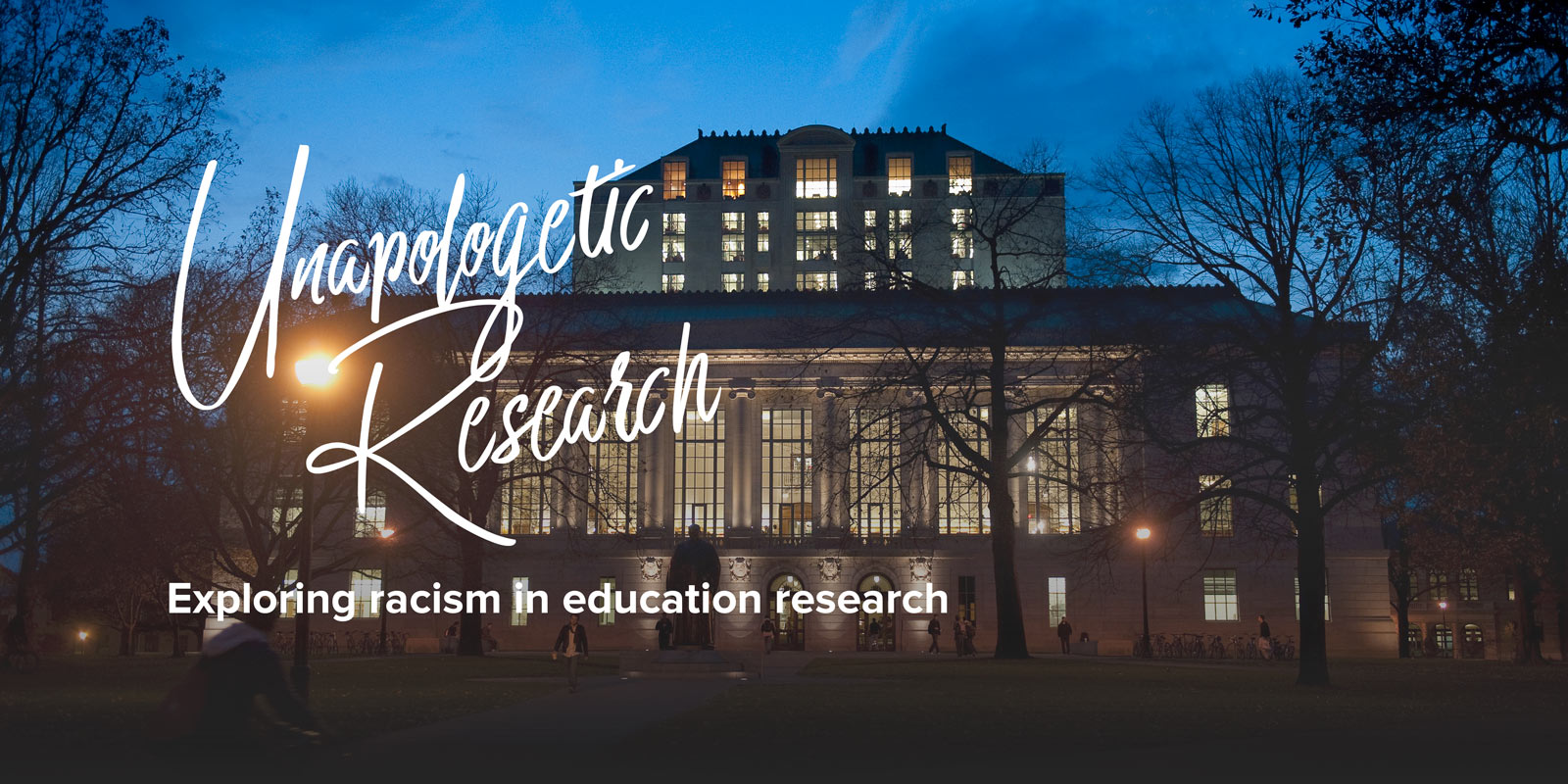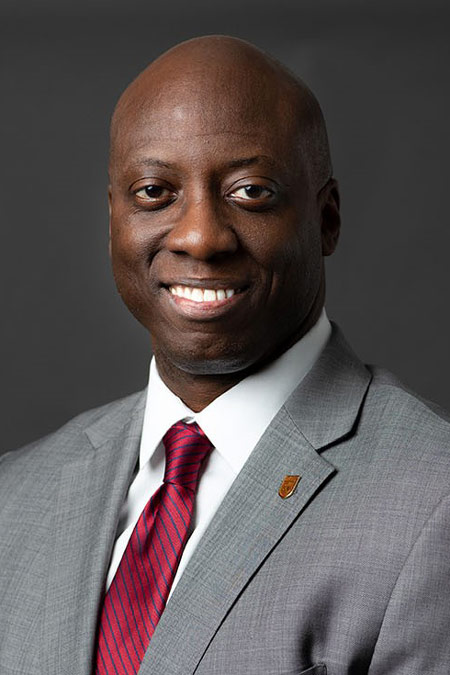
Malik Henfield, ’06 PhD, knows there comes a point when your nine-to-five ambitions must juxtapose with your core values, a moment when your past and present realities must reconcile.
For the researcher, scholar and the former dean of Loyola University’s School of Education, that point came just days after George Floyd was murdered by police officers in Minneapolis. Like many Black Americans, Henfield was in turmoil. Racism was not correcting itself. Reform eluded the country as history repeated its mistakes again and again.
So, he wrote an email. “What’s the saying?” he later recalled. “You seek forgiveness and don’t ask permission. I just sent it out.”
Henfield will be the sixth speaker of Ohio State’s virtual Unapologetic Educational Research Series on April 1 at 3 p.m. The series is hosted by the College of Education and Human Ecology’s Department of Educational Studies and the QualLab.
Rooting out racism from academia
Henfield’s email read in part: “The knees to the necks of Black folks are not only in our streets. They are in our classrooms, in our meetings, in our dining halls, in our dormitories, and in our curriculum. We (Black folks) are tired. Tired of performing survival functions associated with the dominant culture-defined notions of what it means to be ‘professional’ and a ‘strong leader.’…. Tired of biting our tongues in the comfort of the ivory tower while our communities are starved of resources.”
As the education school’s leader, Henfield was putting a stake in the ground, he wrote, urging the campus to infuse anti-racist efforts into everything it does — including research. The next day, the university’s provost called him. Henfield was prepared for pushback.
Instead, the provost asked what he wanted to do. His answer: develop an equity institute based out of the School of Education to forge deep community partnerships that leverage the school’s research and teaching expertise.
“He is one of the few people who has ever told me, ‘You’re thinking too small,’” Henfield said.
You should think about doing this for the entire university, the provost said.
“I crafted a proposal, pitched it to the provost and each of the deans at Loyola, and they all accepted it,” Henfield said. “And here we are.”

Loyola will launch its Institute for Racial Justice in the 2021 autumn semester; Henfield will lead as founding dean.
Henfield’s research has always been equity focused. As a doctoral student at Ohio State, he studied policies and practices influencing gifted ethnic minority students.
“I first met Dr. Henfield when I was a beginning assistant professor at the University of South Carolina,” said James L. Moore III, Ohio State’s vice provost for diversity and inclusion and chief diversity officer, as well as Distinguished Professor of Urban Education in the college. “He took one of my graduate classes, where I first noticed his genius. He has sustained a spectacular trajectory since.”
Henfield’s recent grants include one for a National Science Foundation study on community-engaged activities to increase the recruitment and retention of undergraduates in computer sciences. Through him, the new institute also has landed a $1.4 million collaborative grant from the Institute of Education Sciences. It will examine policies and practices that lead to equitable and excellent gifted education programs for students of color in districts across North Carolina.
The institute will also work with academic units across Loyola to produce scholarship that responds to institutional and cultural racism, anti-blackness and xenophobia. The work stands to become a model for campus and community collaboration in the fight for racial justice and equity.
One reason that’s necessary: Often, faculty don’t realize how they are perceived outside of academia.
Doing research ‘with,’ not ‘on’ community
“We will take a lot of care to be very sensitive to the fact a lot of people outside of the ivory tower are hurting,” he said. “We don’t want scholars going into communities, extracting resources — i.e., participants for surveys and interviews — writing up the data into articles and books and then leaving. The work we do must be mutually beneficial.”
“In the listening that I’ve done and continue to do, this is one of the most prominent fears that has emanated from folks in Chicago communities,” he said. “I’m very much opposed to doing research ‘on’ as opposed to ‘with’ community members. We’re taking our time to figure out which needs make sense for an institute embedded in higher education to help tackle alongside community members.”
The institute is in the early stages of development. But Henfield believes it will be positioned to work as an interceder, both educating the researchers and students about anti-blackness, racial equity and bias and developing strong ties in the community. Six preliminary areas of focus for the institute will be inclusive democracy and civic engagement, fair and equitable education, holistic health and healing, environmental justice and sustainability, liberatory economic mobility and transformative futures, which will encompass the arts and humanities.
Henfield sees vast possibilities for collaboration, including partnering with Loyola’s new School of Environmental Sustainability.
“They have a lot of the scientific expertise,” he said. “I’m hoping to work with faculty, staff and students to bring Asian, Black, Latinx and Indigenous scholars to the table to work on environmental justice issues impacting the well-being of some of the most vulnerable communities around Chicago, the nation and the globe.”
A number of Chicago dumping grounds, for example, have polluted areas largely populated by Black and brown citizens. How can the university and community organizers research the harmful impacts to people living nearby? Can community members, nonprofit organizations and university policy experts drive change?
“How might we be able to work hand-in-hand with folks on the receiving end of environmental racism to push forward policy changes that prevent that from happening today and well into the future?” he said. “The city itself can serve as the lab for some of the work to be done in other places.”
Other ideas include working with the business school to use virtual reality to improve cross-racial interactions in the workplace.
“We also plan to focus on healthcare, the law profession, education — any area that has leadership goals centered on diversity, equity and inclusion in pursuit of a true sense of belongingness in organizations. That’s where we want to be — on the cutting edge of research as it relates to human dignity, ethics and optimal performance.”
Henfield’s April 1 session will focus on unapologetically centering equity and inclusion in these types of research, but also how he hopes to develop the apparatus to experiment with systemic changes at scale at Loyola University Chicago.
“I look forward to being surrounded by a tightknit community of educators, scholars and community stakeholders who are open to developing and implementing new and different ideas to help bring about systemic change and, most importantly, unafraid of failure,” he said.

